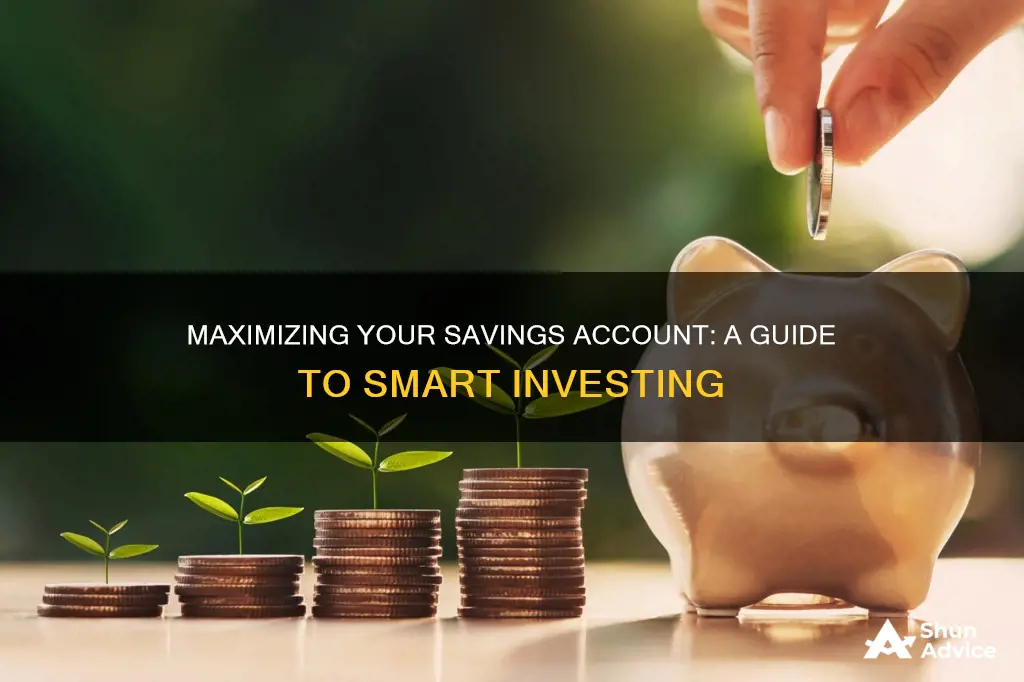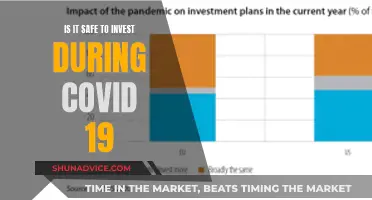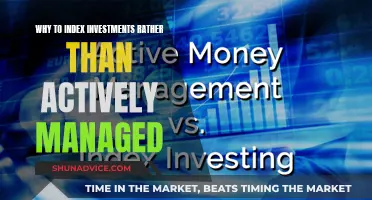
If you're looking to invest money for the short term, you're probably seeking a safe place to keep your cash before you need to access it in the near future. Short-term investments are those made for less than three years. They are often highly liquid, so you can get your money whenever you need it. However, they usually offer lower yields than long-term investments.
- High-yield savings accounts
- Cash management accounts
- Money market accounts
- Short-term corporate bond funds
- Short-term US government bond funds
- Money market mutual funds
- No-penalty certificates of deposit
| Characteristics | Values |
|---|---|
| Interest rates | Vary among savings instruments |
| Safety | Low-risk compared to stocks |
| Accessibility | Online banking has expanded variety and accessibility |
| Protection | Money in a savings account is insured by the Federal Deposit Insurance Corporation (FDIC) |
| Restrictions | Service fees for more than the permitted number of monthly transactions |
| High-yield savings accounts | Earn a higher interest rate than a standard savings account |
| Certificates of Deposit (CDs) | FDIC-insured; higher interest rate with larger and longer deposits |
| Money market funds | Mutual fund that invests only in low-risk securities |
| Money market deposit accounts | FDIC-insured; require a minimum initial deposit and balance |
| Treasury bills and notes | Backed by the full faith and credit of the U.S. government |
What You'll Learn

High-yield savings accounts
When choosing a high-yield savings account, there are two main features to consider: the Annual Percentage Yield (APY) and fees. APY is the primary reason to opt for a high-yield savings account, so look for an account that pays a high rate of interest. Fees are also important to consider, as some banks charge monthly fees on their savings accounts. While these fees can often be avoided by maintaining a minimum balance or making a minimum deposit, it is best to opt for an account with no monthly fees if possible.
It is also worth noting that high-yield savings accounts may have more stringent requirements than traditional savings accounts. For example, some banks may require a larger deposit to qualify for a high-yield savings account. Additionally, accessing your money may be slightly more complicated, as high-yield savings accounts are often offered by online banks or institutions separate from your primary bank. This can result in a delay of a couple of days when transferring funds to your checking account.
Some top high-yield savings accounts include:
- Western Alliance Bank High-Yield Savings Account: Requires a minimum deposit of $1 to open, no monthly fees, and offers a high APY.
- LendingClub LevelUp Savings Account: Offers a competitive APY, a free ATM card with no fees, and the option to earn the highest APY by making monthly deposits of at least $250.
- Capital One 360 Performance Savings: Offers an APY comparable to online banks, with no monthly fees or minimum balance requirements, and access to over 70,000 fee-free ATMs, 300 branches, and more than 40 Capital One Cafés nationwide.
- Ally Bank: An established online bank offering competitive interest rates, no monthly fees, and no minimum balance requirements.
- Live Oak Bank: An online bank offering some of the best interest rates on the market, with no minimum balance or monthly fees.
- Bread Savings: An online bank offering a competitive APY and no minimum balance requirements to earn the APY or avoid fees.
529 Savings Plans: Smart Investment Strategies, per Forbes
You may want to see also

Money market accounts
MMAs often come with a debit or ATM card, check-writing capabilities, and a minimum balance requirement. They may also charge monthly maintenance or service fees and impose a limit on the number of monthly transactions.
- Discover® Money Market Account: This account offers a competitive yield of 3.80% for balances up to $100,000 and 3.85% for higher balances. It has few fees, check-writing privileges, and access to 60,000 ATMs. However, there are no physical branch locations.
- Quontic Bank Money Market Account: This account offers a competitive tiered interest rate structure, with a yield of 5.00% on all balance tiers. It requires a minimum deposit of $100 to open and provides access to over 90,000 ATMs nationwide. However, there are no physical branch locations.
- NASA Federal Credit Union Premier Money Market: This account offers a decent yield of 1.75% and good customer service, including a highly-rated mobile app and live chat support. It requires a minimum deposit of $10,000 to open and charges no monthly maintenance fee.
- First Internet Bank Money Market Savings: This account offers a competitive yield of 3.77% on daily balances of $1 million or less and 4.95% on higher balances. It has a monthly fee of $5 for balances under $4,000 and does not provide an ATM card.
- Synchrony Bank Money Market Account: This account offers a relatively high yield of 2.25% on all balance tiers, with no minimum deposit or monthly maintenance fee. It provides ATM fee reimbursements of up to $5 and check-writing privileges. However, the APY is not the highest available.
- Northern Bank Direct Money Market Account: This account pays a competitive yield of up to 4.75% on balances up to $250,000. It allows unlimited ATM withdrawals from fee-free, in-network locations but requires a minimum opening deposit of $5,000.
- Sallie Mae Bank Money Market Account: This account offers a competitive yield of 4.20% with no minimum deposit or monthly maintenance fee. It provides check-writing privileges but does not include a debit card. The mobile app could be more user-friendly.
- Redneck Bank Mega Money Market: This account offers a high yield of 4.40% on balances up to $100,000, with no monthly maintenance fee. However, the APY drops to 0.50% on balances above $100,000, and there is a limit of six free transactions per month.
- CIT Bank Money Market Account: This account offers a decent yield of 1.55% with a low minimum deposit of $100 and no monthly maintenance fee. However, it does not include check-writing privileges or ATM access.
- VirtualBank eMoney Market: This account offers a yield of 4.75% on all balance tiers, with a low minimum deposit of $100. However, there is a $5 monthly maintenance fee, and the number of transactions is limited to six per month.
Invest Wisely to Secure Grandkids' College Education
You may want to see also

Short-term investment options
Short-term investments are those you make for less than three years. They are often highly liquid, meaning you can get your money whenever you need it. They also tend to be lower-risk investments than long-term investments, so you may have limited downside or no risk at all.
- High-yield savings accounts: These accounts are a good alternative to holding cash in a checking account, which typically pays very little interest. High-yield savings accounts are insured by the Federal Deposit Insurance Corporation (FDIC) at banks and by the National Credit Union Administration (NCUA) at credit unions, so you won't lose money. You can typically earn much higher interest rates at online banks than at national, brick-and-mortar banks.
- Cash management accounts: These accounts allow you to put money into a variety of short-term investments and act like an omnibus account. They are often invested in safe, low-yield money market funds, so there is not a lot of risk. Cash management accounts are extremely liquid, and money can be withdrawn at any time.
- Money market accounts: Money market accounts are another kind of bank deposit that usually pays a higher interest rate than regular savings accounts, though they typically require a higher minimum investment, too. They are FDIC-insured, so your account will be protected from losing money, up to $250,000 per depositor, per bank. Money market accounts are highly liquid, though federal laws impose some restrictions on withdrawals.
- Short-term corporate bond funds: Corporate bonds are issued by major corporations to fund their investments. They are typically considered safe and pay interest at regular intervals. A short-term corporate bond fund is not insured by the government, so it can lose money, but bonds tend to be quite safe, especially if you're buying a broadly diversified collection of them.
- Short-term US government bond funds: Government bonds are issued by the US federal government and its agencies. They are considered low-risk and are backed by the full faith and credit of the United States. A fund of short-term bonds means an investor takes on a low amount of interest rate risk. Government bonds are among the most widely traded assets on the exchanges and can be bought and sold on any day the market is open.
- Money market mutual funds: Money market mutual funds invest in short-term securities, including Treasurys, municipal and corporate debt, and bank debt securities. While their investments are generally safe, money market funds are not as safe as money market accounts, which are FDIC-backed. Investors in money market mutual funds will earn a yield on their investment, typically without much fluctuation in the principal.
- No-penalty certificates of deposit (CDs): CDs are time deposits where you agree to hold the money in the account for a specified period of time. In exchange, the bank will pay you a higher interest rate. A no-penalty CD lets you dodge the typical fee that a bank charges if you cancel your CD before it matures. CDs are insured by the FDIC, so you won't lose any money on them.
- Treasury bills (T-bills): T-bills are US government debt securities with a maturity of less than one year. They are issued on a weekly basis and can be easily cashed in at any time. You can purchase T-bills in the US through any of the 12 Federal Reserve banks or 25 branch offices.
- Commercial paper: Commercial paper is an unsecured, short-term loan issued by a corporation, usually for financing accounts receivable and inventories. It is issued at a discount to reflect current market interest rates and maturities usually range up to nine months. Because of their slightly higher risk, they offer a higher rate of return than a T-bill.
- Certificates of deposit (CDs): CDs are time deposits at banks that may not be withdrawn on demand. They carry a specific maturity date (three months to five years), a specific interest rate, and can be issued in any denomination. While nearly every bank offers CDs, rates can vary widely, so it's important to shop around.
- Banker's acceptances (BA): BAs are short-term credit investments created by non-financial companies and guaranteed by a bank. They are traded at a discount to face value in the secondary market and can be sold off in secondary markets where they are constantly traded.
Invest Wisely for Your Grandchild's Future: A Guide
You may want to see also

Savings account interest rates
Here's a closer look at the interest rates offered by different types of savings accounts:
High-Yield Savings Accounts
High-yield savings accounts typically offer much higher interest rates than traditional savings accounts, often around 4% to 5% APY. These accounts are usually offered by online banks or the online divisions of brick-and-mortar banks. While they provide higher interest rates, high-yield savings accounts may have higher minimum balance requirements or other restrictions.
Traditional Savings Accounts
Traditional savings accounts, often offered by large national banks, tend to have much lower interest rates, sometimes as low as 0.01% APY. These accounts usually have lower minimum balance requirements and provide easier access to funds, but they may not offer the same level of interest earnings as high-yield accounts.
Money Market Accounts
Money market accounts are a type of savings account that typically offers higher interest rates, similar to high-yield savings accounts. Money market accounts often provide check-writing privileges and an ATM or debit card, making them more flexible than traditional savings accounts. However, they usually come with higher minimum deposit requirements and may have monthly fees.
Certificates of Deposit (CDs)
Certificates of Deposit (CDs) offer higher interest rates than regular savings accounts, especially for larger and longer deposits. CDs require you to keep your money in the account for a specified period, and early withdrawal may result in penalties. CD interest rates can be competitive, but the funds are less accessible than in a savings account.
When choosing a savings account, it's important to consider not only the interest rate but also the fees, minimum balance requirements, and other features that meet your financial needs. It's also crucial to ensure that your deposits are federally insured by the FDIC or NCUA to protect your funds in case of bank failure.
Maximizing HSA Savings: Investment Strategies for Tax-Free Growth
You may want to see also

Long-term vs short-term investments
When it comes to investing in a savings account, there are several options to consider, each with its own advantages and disadvantages. These options can be broadly categorised into two types: long-term and short-term investments.
Long-Term vs. Short-Term Investments
Long-term investments are designed for those who are willing to put their money away for an extended period, usually at least a year. These investments often come with higher risks but potentially higher returns as well. Long-term investments are suitable for individuals who can afford to leave their money untouched for a significant amount of time and don't have immediate plans for it, such as buying a car or a house.
On the other hand, short-term investments are financial investments that can be easily converted to cash within a shorter time frame, typically within five years, and often between three to twelve months. Examples of short-term investments include high-yield savings accounts, money market accounts, and certificates of deposit (CDs). While short-term investments generally offer lower rates of return, they provide the benefit of liquidity and flexibility. This means that investors can quickly access their money if needed without incurring significant losses.
Advantages and Disadvantages
Short-term investments are ideal for those seeking stable and liquid options to grow their wealth. They are less risky than long-term investments, making them a good choice for those who want to protect their capital. Additionally, short-term investments can help diversify income types, which is beneficial in case of market volatility.
However, one of the main drawbacks of short-term investments is their typically lower rates of return compared to long-term investments. Moreover, any decline in the value of a short-term investment can directly impact the net income of a business or individual.
Examples of Short-Term Investments
- Certificates of Deposit (CDs): Offered by banks, CDs often provide higher interest rates as they require locking up cash for a specific period, usually ranging from several months to five years. They are FDIC-insured for up to $250,000.
- Money Market Accounts: These accounts offer higher returns than regular savings accounts but typically require a minimum investment. They are FDIC-insured, ensuring the safety of your funds.
- High-Yield Savings Accounts: These accounts provide a higher interest rate than standard savings accounts, often requiring a larger initial deposit. They are also FDIC-protected, giving you peace of mind.
- Government Bonds and Treasury Bills: These investments are backed by the full faith and credit of the government and are considered low-risk. Treasury bills are sold at a discount and increase in value over time, providing a fixed rate of return.
Frequently asked questions
There are several types of savings accounts, including high-yield savings accounts, money market deposit accounts, and certificates of deposit (CDs). Each has its own pros and cons in terms of interest rates, liquidity, and associated risks.
When choosing a savings account, consider factors such as the interest rate, minimum deposit and balance requirements, liquidity needs, and associated fees. Compare options from different banks and credit unions to find the best fit for your financial goals.
Savings accounts offer a low-risk way to grow your money over time. While the interest rates may be relatively low, your funds are generally insured and protected, providing a stable option for short-term financial goals.
Opening a savings account is a straightforward process, similar to setting up a checking or investment account. You'll typically need to provide personal information, such as your name, contact details, and Social Security number. Some accounts may also require a driver's license or other identification.
Savings accounts have limitations, such as restricted monthly withdrawals and low interest rates that may not keep up with inflation. They are best suited for short-term financial goals and should be considered as part of a broader investment strategy that includes other types of investments.







